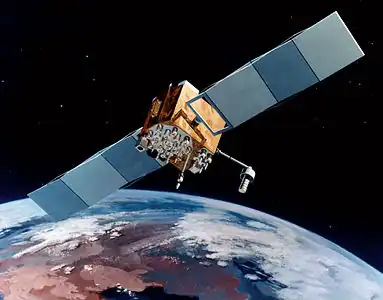 A Block IIF GPS satellite | |
| Mission type | Navigation |
|---|---|
| Operator | US Air Force |
| COSPAR ID | 2014-008A[1] |
| SATCAT no. | 39533[1] |
| Mission duration | 12 years (planned) |
| Spacecraft properties | |
| Spacecraft | GPS SVN-64 (IIF-5) |
| Spacecraft type | GPS Block IIF |
| Manufacturer | Boeing |
| Launch mass | 1,630 kilograms (3,590 lb)[2] |
| Start of mission | |
| Launch date | 21 February 2014, 01:59 UTC |
| Rocket | Delta IV-M+(4,2), D365[3] |
| Launch site | Cape Canaveral SLC-37B[3] |
| Contractor | ULA |
| Orbital parameters | |
| Reference system | Geocentric |
| Regime | Medium Earth (Semi-synchronous) |
| Perigee altitude | 20,175 km (12,536 mi)[4] |
| Apogee altitude | 20,191 km (12,546 mi)[4] |
| Inclination | 54.96 degrees[4] |
| Period | 717.99 minutes[4] |
| Epoch | 22 April 2014 |
USA-248, also known as GPS IIF-5, GPS SVN-64 and NAVSTAR 69, is an American navigation satellite which forms part of the Global Positioning System. It was the fifth of twelve Block IIF satellites to be launched.[2]
Launch
Built by Boeing and launched by United Launch Alliance, USA-248 was launched at 01:59 UTC on 21 February 2014, atop a Delta IV carrier rocket, flight number D365, flying in the Medium+(4,2) configuration.[3] The launch took place from Space Launch Complex 37B at the Cape Canaveral Air Force Station,[5] and placed USA-248 directly into medium Earth orbit.[4]
Orbit
As of 22 April 2014, USA-248 was in an orbit with a perigee of 20,175 kilometers (12,536 mi), an apogee of 20,191 kilometers (12,546 mi), a period of 717.99 minutes, and 54.96 degrees of inclination to the equator.[4] It is used to broadcast the PRN 30 signal, and operates in slot 6 of plane A of the GPS constellation. The satellite has a design life of 15 years and a mass of 1,630 kilograms (3,590 lb). [2] It is currently in service following commissioning on May 30, 2014.[6]
References
- 1 2 "Navstar 69". US National Space Science Data Center. Retrieved 21 February 2014.
- 1 2 3 Krebs, Gunter. "GPS-2F (Navstar-2F)". Gunter's Space Page. Retrieved 21 February 2014.
- 1 2 3 McDowell, Jonathan. "Launch Log". Jonathan's Space Page. Retrieved 21 February 2014.
- 1 2 3 4 5 6 McDowell, Jonathan. "Satellite Catalog". Jonathan's Space Page. Retrieved 21 February 2014.
- ↑ McDowell, Jonathan. "Launch List". Launch Vehicle Database. Jonathan's Space Page. Retrieved 21 February 2014.
- ↑ "NOTICE ADVISORY TO NAVSTAR USERS (NANU) 2014047". United States Coast Guard. Retrieved 31 May 2014.